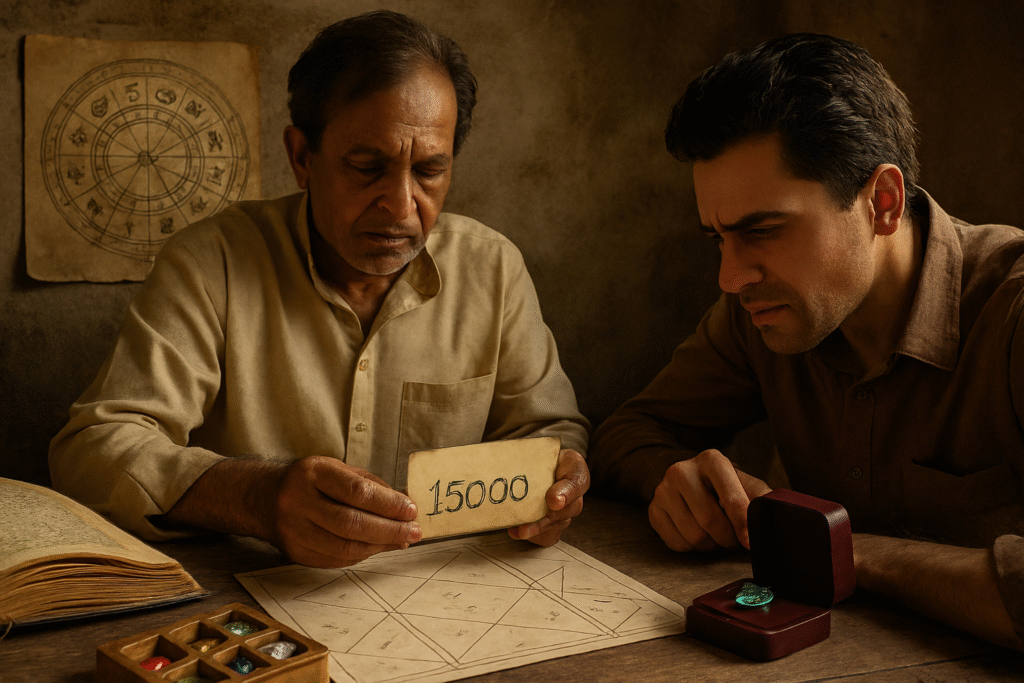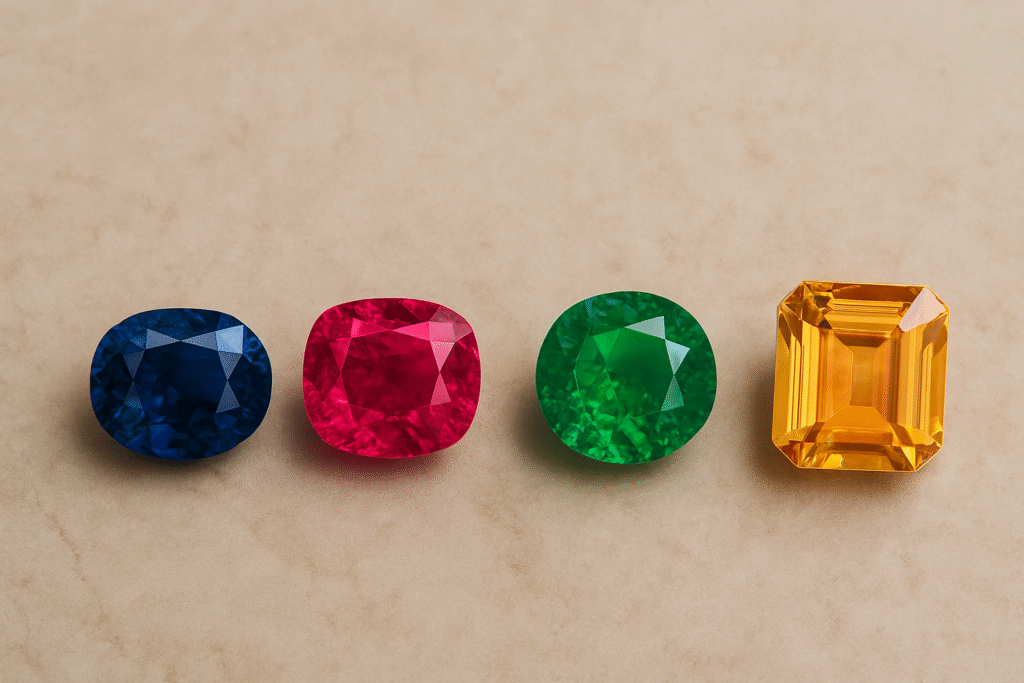When shopping for gems and jewelry, you need to follow practical rules that protect your money and guarantee quality.
- Always buy from a trusted jeweler
- Always ask for a detailed receipt
A reliable jeweler gives you authenticity and accountability. A proper receipt documents purity, gemstone type, and any warranty.
How to Inspect Jewelry Before Buying
Use a 10x magnifying lens. Check:
- Settings: Are the stones held firmly?
- Metal markings: Look for purity marks such as 22K, 18K, 925 (silver), or Pt950 (platinum).
- Maker’s mark: A traceable hallmark adds credibility.
- Stones: Examine for chips, cracks, or flaws that affect beauty and durability.
💡 The key is simple: You rarely find bargains in the gem world. Quality comes at a fair price.
Why Low Prices Can Be Risky
Cheaper jewelry may signal:
- Lower quality materials
- Incorrect labeling (e.g., citrine sold as topaz, or green glass sold as jade)
- Misleading trade names
Research shows that over 60% of jewelry complaints involve misrepresentation of gems.
Understanding Gemstone Value
The value of a gemstone depends on:
1. Color
- Strong, natural colors fetch higher prices.
- Lighting affects how you see color. Always check under natural light.
2. Clarity
- Diamonds, topaz, aquamarine, and tanzanite are judged strictly on inclusions.
- Emeralds and red tourmalines almost always show inclusions, so grading is more lenient.
3. Cut
- Proportions and finish affect sparkle and durability.
- Poorly cut stones may break more easily.
- A high-quality cut improves brilliance by up to 30% compared to average cuts.
4. Carat Weight
- Larger gems cost more per carat because they’re rarer.
- Stones above 40 carats may drop in value if they become impractical for jewelry use.
Case Example: Emeralds
An emerald with vivid green color but visible inclusions can cost more than a flawless light-colored stone. The market pays for intensity of color, not just clarity.
FAQ: Shopping for Gems and Jewelry
Q: What documents should I ask for when buying jewelry?
A: Always request a bill with details on purity, stone weight, and certification.
Q: Are bargains in gemstones real?
A: Rarely. A low price often means poor quality or misrepresentation.
Q: Which factor affects gemstone price the most?
A: Color. For example, a fine blue sapphire can be 50% more expensive than a similar but paler stone.
Q: How do I avoid buying fake jade?
A: Ask for a gemological certificate and avoid vague labels like “jade-like stone.”
Quotable Insights
- “You rarely find true bargains in the gem market. Value is tied to quality and trust.”
- “Color is the single biggest driver of a gemstone’s price.”
- “A skilled cut can increase brilliance by 30% or more.”
Small Luxury Hotels FAQ
Introduction
This small luxury hotels FAQ answers common questions about boutique stays. It explains definitions, differences with large chains, and which services to expect. In addition, it covers family options, sustainability, and tips on finding the right property.
What defines a small luxury hotel?
- Fewer than 100 rooms.
- Personalized attention and privacy.
- Strong links to local design.
- Locations in unique urban or rural areas.
As a result, travelers often choose them for a more intimate experience. Moreover, their distinctive style sets them apart from standardized hotels.
Why choose a small luxury hotel?
Personal service
Staff remember guest details, therefore creating a sense of familiarity.
Calm spaces
Unlike large hotels, these properties feel quieter, so you can relax more easily.
Local culture
For example, menus highlight regional produce, and interiors reflect local crafts.
In addition, many guests return because the experience feels authentic.
How do small luxury hotels differ from large chains?
Guest experience
Small hotels provide tailored attention, while chains rely on uniform systems.
Property identity
Each boutique hotel has its own theme. On the other hand, large chains repeat formats worldwide.
Dining approach
Menus change seasonally and locally. Therefore, guests enjoy fresh variety instead of standard global menus.
Are small luxury hotels only for leisure stays?
Business features
- Lounges double as meeting rooms.
- Private dining options support work dinners.
Digital needs
- Fast Wi-Fi supports remote work.
- Quiet spaces help concentration.
Because of these advantages, small luxury hotels appeal to both business and leisure travelers.
What services can you expect?
- Concierge services for tours and dining.
- Fine dining menus with seasonal ingredients.
- Spa and wellness treatments.
- Added extras like minibars and welcome gifts.
Moreover, services shift depending on location. For example, a city hotel might offer cultural tours, while a rural retreat offers farm experiences.
Are small luxury hotels family-friendly?
Options for families
- Connecting rooms for parents and children.
- Child-friendly amenities such as menus or games.
Adults-only stays
- Some properties focus on privacy.
- Guests find peaceful, child-free environments.
Therefore, always check booking policies, because each hotel sets its own approach.
Do these hotels support sustainability?
Sourcing and dining
Farm-to-table meals reduce transport impact. In addition, guests enjoy fresher produce.
Environmental focus
Plastic use is restricted, while refillable bottles are encouraged. Smart energy systems reduce wastage.
Local involvement
Hotels support the community by hiring regionally. As a result, growth extends beyond the property.
How do you find the right small luxury hotel?
Define needs
Decide if food, spa, culture, or privacy is your top priority.
Check guest feedback
For example, repeat reviews about service often signal consistency.
Compare value
Packages may include meals, transfers, or early check-in. Therefore, higher prices can still deliver stronger value.
Are small luxury hotels worth the price?
Value of service
Guests pay for attention, comfort, and privacy. Moreover, experiences feel tailored and unique.
Extras add value
Some hotels include exclusive experiences or benefits. Finally, weigh these extras against nightly rates.
As a result, many travelers feel these hotels justify their price when quality matters most.



